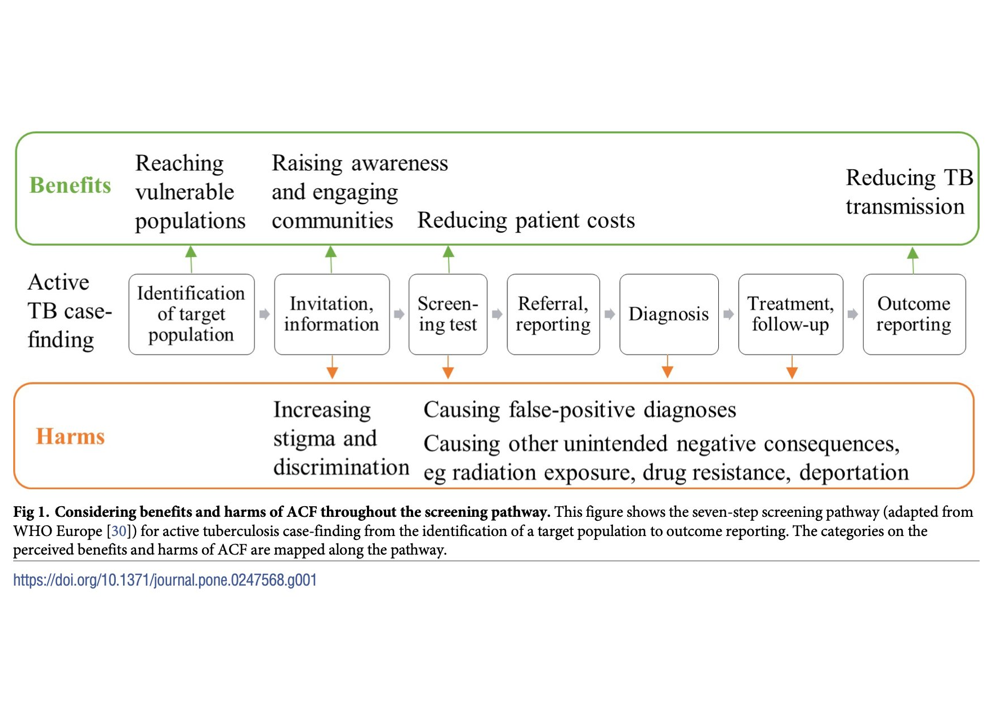Biermann O, Klüppelberg R, Lönnroth K, Viney K, Caws M, Atkins S. ‘A double-edged sword’: Perceived benefits and harms of active case finding for people with presumptive tuberculosis and communities-A qualitative study based on expert interviews. PLoS One. 2021 Mar 11;16(3):e0247568. doi: 10.1371/journal.pone.0247568.
Planning and implementing public health interventions, such as screening, requires careful consideration of the benefits and harms for the people targeted, communities and the health system more broadly.
In a study recently published in PLOS One, researchers at Karolinska Institutet aimed to understand how experts perceive the benefits and harms of community-based tuberculosis screening, also known as active case-finding, for people with presumptive tuberculosis and communities.
“Diving into experts’ views, we learned that it is important to consider the benefits and harms of community-based tuberculosis (TB) screening not just in the planning phase but throughout the screening pathway to be able to reap the benefits and mitigate harms”, says Olivia Biermann, PhD student and first author of the publication.
On the one hand, the perceived benefits of screening included reaching vulnerable populations, reducing patient costs, helping raise awareness for TB among individuals and engaging communities. On the other hand, screening was also described as a ‘double-edged sword’ that can cause harms like stigma and discrimination, false-positive diagnoses, as well as other unintended negative consequences.”
The World Health Organization and the Sustainable Development Goals emphasize the need for such screening in the fight against tuberculosis, as it is estimated that one third of people with the disease are never diagnosed and treated. Yet, the evidence base for the benefits of community-based screening for individuals is relatively limited. Policy decisions still need to be made, though, and rely on experts’ perceptions of the benefits and harms.
“This study opened my eyes to the challenges in making judgements on the benefits and harms of screening, as they are difficult to quantify (e.g., increased stigma) or compare (e.g., reduced transmission versus false-positive results). Evaluating the potential benefits and harms of TB screening may be even more challenging in high Tb burden settings, as many low- and middle-income countries do not have established processes for the development of screening policies in place”
The results of this study relevant for planning and implementing community-based TB screening, but even COVID-19 screening. It is important to avoid ‘screeningitis’ that does more harm than good.”, says Olivia Biermann. Source.
This study is based on the same interviews as the preceding expert interview study, and further complements the scoping review and survey with NTP managers that have also touched upon the perceived benefits and harms of active case finding (ACF).
Olivia Biermann tells on Twitter and in a short video about the findings of the study.
NEW! ⚔️ Qualitative study on the ‘double-edged sword’ of active #tuberculosis case-finding. #Screening always involves benefits and harms that must be scrutinised to inform design and implementation. 1/5 #endTB #ACF @karolinskainst @impact_tb @plosone https://t.co/8F48b4wKtH pic.twitter.com/svIvLK554m
— Dr. Olivia Biermann (@olibiermann) March 15, 2021
Olivia Biermann will defend her PhD thesis at Karolinska Institutet on 6 May 2021 at 9:30 am GMT+1 (you can request the link to Zoom stream by sending a message to olivia.biermann@ki.se). Thesis title: Global policy to local implementation: experiences from active tuberculosis case finding in high-burden countries.

